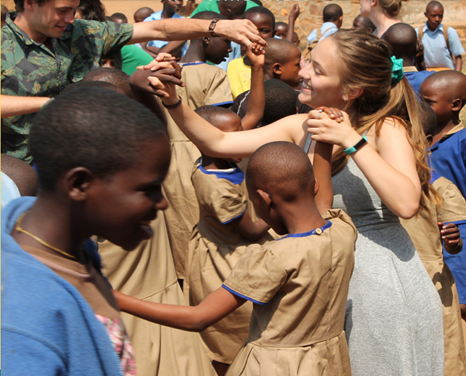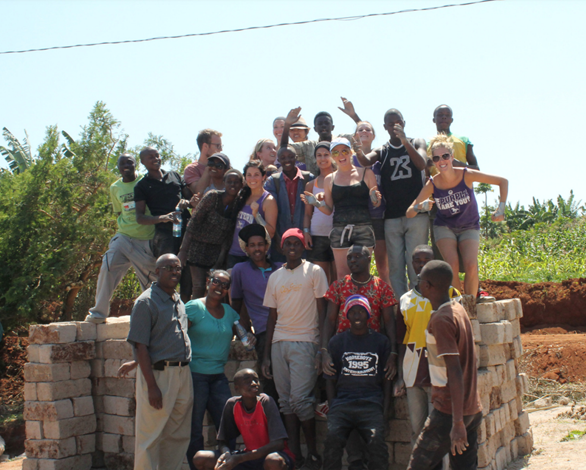Kwibuka: Bringing Rwanda to the World
 Written By
Written By
Professor Henri Boyi
Department of French. Faculty of Arts and Humanities
Western University
April 11, 2023
Since 1994, the months of April to July, which cover the period named Kwibuka (to remember), have been extremely painful for every Rwandan and should be for every human being who cares about our shared humanity. This is a time of bereavement, indeed, as Rwandans get together to mourn, to cry again, to pray, to remember, and hopefully to gain some strength from one another, in order to carry on with their tomorrows and help guide the country’s future generations. The Kwibuka period represents an incredibly sad moment for all of us, as we all try to reflect on the unthinkable: the Rwandan genocide.
The genocide took over a million Tutsis and some moderate Hutus in one hundred days. This was a mass slaughter that engulfed Rwanda at a uniquely staggering speed: the fastest mass genocide ever recorded in human history, right under the world’s eyes. This was a brutal mass slaughter that did not spare babies, children, pregnant women, the elderly, or the handicapped. And the world watched! And the world knew! At least all those who could have stopped the genocide knew well before it started that what was known as « the final solution to the Tutsi problem » was being planned and organized. Public media and other forms of teaching went on in schools and churches, in families and neighbourhoods, to degrade the humanity of Tutsis and to ensure that the so-called final solution would be successfully carried out.
Bringing Rwanda to the World, for Rwandans and all those who care about humanity, is to tell the story and to relate history to true and sincere reflections, on how elements of evil can lead to the unimaginable degradation of humanity. It is to say NO to the killers and those who supported and are still supporting them. Bringing Rwanda to the world is to show that human beings, no matter how deep their hatred is, cannot erase an entire race. It is to show the world that it was wrong to watch a mass massacre go on idly. General D’allaire said it clearly, the world could just watch because we all know « Rwanda has no oil, and Rwandans are not white ».
I regard General D’allaire as one of the many heroic men and women who survived the Rwandan genocide; one of those who survived to bring Rwanda to the World; and he did indeed. Here is a lamentation of questions with no possible answers:
“I told the story of meeting a three-year-old orphan on a road lined with huts filled with the Rwandan dead. I still think of that little boy, who if he lived would be a teenager as I write. What has happened to him, and the tens of thousands of other orphans of the genocide? Did he survive? Was he reunited with any members of his family, or was he raised in one of Rwanda’s overcrowded orphanages? Did anyone care for him and love him for himself, or was he raised with hate and anger defining his young life? Did he find it in himself to forgive the perpetrators of the genocide? Or did he fall prey to ethnic hate propaganda and the desire for retribution and take his part in perpetuating the cycle of violence? Did he become yet another child soldier in the region’s wars?”
“When I think about the consequences of the Rwandan genocide, I first think of those who died an agonizing death from machete wounds, those who died inside the hundreds of sweltering churches, chapels, and missions where they had gone to seek God’s protection and ended instead in the arms of Lucifer. I think of more than 300,000 children who were killed, and of those children who became killers in a perversion of any culture’s idea of childhood. Then I think of the children who survived, orphaned by the genocide and abandoned by us as we abandoned their parents in the killing fields of Rwanda.”
Twenty-eight years later, let Rwanda show the world and keep reminding them that allowing and watching the slaughter go on was wrong. It was wrong then, it is wrong now, and it will always be wrong.
Even when the mass killings started, despite widespread information from diplomats, journalists, and other observers on the ground, willingly or not, the world powers, including the UN refused to acknowledge that this was genocide publicly. Avoiding the term gave more time and green light to the killers.
Among the many facts, the last telegram that General D’allaire sent on April 8th to the UN clearly stated that Tutsis were being exterminated because they were Tutsis. But this, too, failed to move those in the headquarters to any action, as did many other telegrams he had sent before.
Bringing Rwanda to the world is to renew the sometimes-forgotten universal pledge, « Never Again », declared by the community of Nations almost 50 years before the Rwandan Genocide. It is reminding the world that the problem is not failing, or falling, the problem is failing and dwelling in failure; it is falling and the enjoying to be stuck in the mud. It is to deny and defy the possibility of Evil’s triumph. Hence, the possibility to reach true and vast reconciliation, which requires sincere heartfelt apologies and forgiveness. This does not happen in a few years.
Twenty-eight years after the genocide, Rwanda has risen from ashes to glory. Rwanda stands tall amongst other nations which have implemented the United Nation’s goal to Sustainable Development. Therefore, bringing Rwanda to the world would be to showcase some of the many success stories that make Rwanda the regional and global leader it has become. The World Bank has praised Rwanda for keeping a robust economic growth that averaged more than 7 percent within a six-year period leading up to 2019. There is no doubt that growth slowed down during the last two years of Covid-19; as it did everywhere in the world. Success stories would include, for instance, quality education at all levels. The University of Rwanda, for example, has four African centers of excellence in designated areas that serve several countries in Eastern and Southern Africa.
With more than 61% of members in Parliament, 55% of ministers in The Cabinet constitute of females, there is little doubt that Rwanda is on the list of the top global leaders in sustainable gender equality. Furthermore, bringing Rwanda to the World is to use the country’s impressive healthcare system that has strongly improved the quality of life for its citizens. Rwanda has established a decentralized universal health care system that allows the development of programs that serve different communities within the country's district. It is worth mentioning that reliable sources maintain that life expectancy in Rwanda has gone from 27 years in 1992 (two years before the genocide) to 70 years in 2022. Moreover, Rwanda is one of the first countries in the world to use drones to deliver lifesaving supplies such as blood and other products to remote rural health centers.

It goes without saying that Rwanda can teach the world important lessons in diverse areas of learning and dissemination of knowledge.
For the last 10 years, I have spent six weeks in Rwanda with my Canadian students who travel to “the land of a thousand hills” as Rwanda is known, for international experiential learning. This is part of the course I teach at the University of Western Ontario, Rwanda: Culture, History, and Reconstruction. More than 130 Canadian students have taken this course and have all acclaimed it as the best learning opportunity that the University has offered them. Misha Apel, one of the former students and teaching assistant of this course states the following:
“Rwanda taught me more than I have ever learned about myself, and the world through an intercultural competence, post-conflict, and transitional justice lens. Most importantly, I learned about the meaning of Ubuntu, a Bantu philosophical term that means ‘I am because you are,’ a concept of mutual human kindness. This program taught me to be more appreciative of the influences of people around me who have helped steer me to become the person I am today. No matter where we come from or what we do, we are part of one large family which supports each other in becoming the best versions of ourselves, for mutual growth and the benefit of the collective.”
Every time I visit Rwanda, I travel south, north, east, and west and I watch and observe the booming life. I hear those who are happy and proud of the undeniable progress that the country has made. Whether people like it or not, Rwanda has set a model of development not only for Africa but for the entire world. As I go around the country with my Canadian students, we are undoubtedly amazed at the progress of the nation considering its recent tragic past. To say the least, this is a beautiful country of resilient and strongly determined people who work hard for a brighter future. I cannot wait to visit the land of a thousand hills again with my students in three days to work with our community partners for another five weeks.

2013 team helping prepare the ground for Centre Marembo's newly built clinic. Photo by Henri Boyi
Photo by Michael Muli on Unsplash
